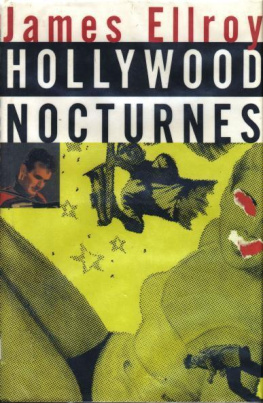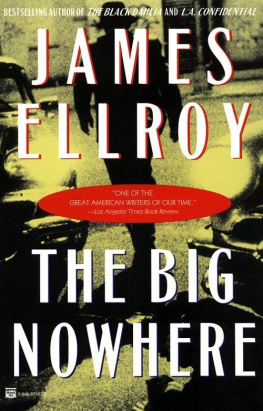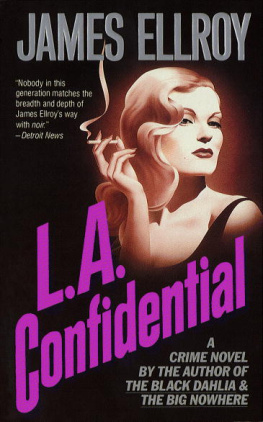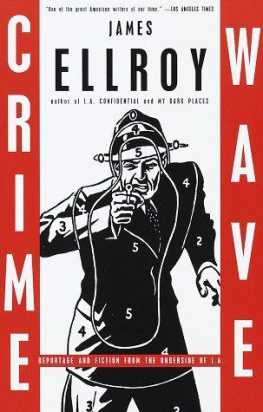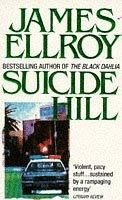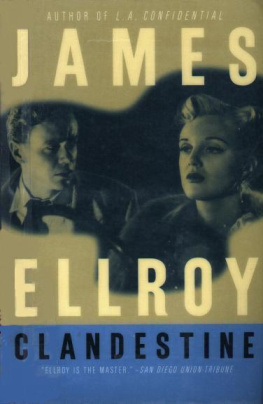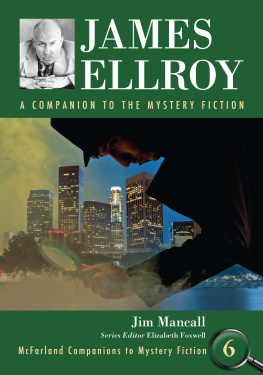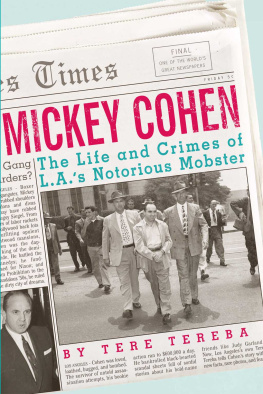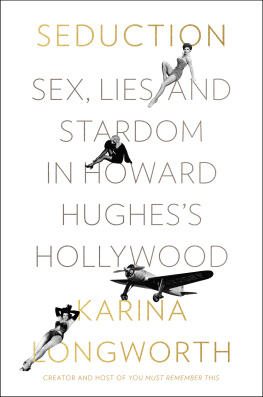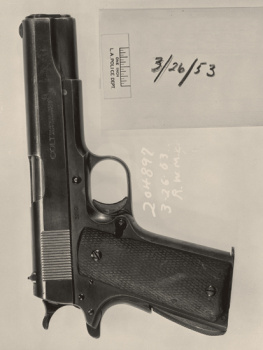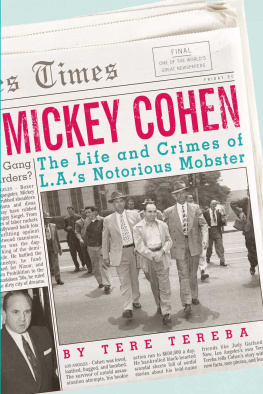ABOUT THE AUTHOR
James Ellroy was born in 1948 in Los Angeles, the city that has served as the inspiration for his acclaimed noir novels. His novels The Black Dahlia, The Big Nowhere, L.A. Confidential, and White Jazz were international bestsellers. He lives in Connecticut.
OUT OF THE PAST
A man gyrating with an accordion--pumping his "Stomach Steinway" for all its worth.
My father pointing to the TV. "That guy's no good. He's a draft dodger."
The accordion man in a grade Z movie: clinching with the blonde from the Mark C. Bloome tire ads.
* * *
Half-buried memories speak to me. Their origin remains fixed: L.A., my hometown, in the '50s. Most are just brief synaptic blips, soon mentally discarded. A few transmogrify into fiction: I sense their dramatic potential and exploit it in my novels, memory to moonshine in a hot second.
Memory: that place where personal recollections collide with history.
Memory: a symbiotic melding of THEN and NOW. For me, the spark point of harrowing curiosities.
The accordion man is named Dick Contino.
"Draft Dodger" is a bum rap--he served honorably during the Korean War.
The Grade Z flick is _Daddy-O_--a music/hot rod/romance stinkeroo.
Memory is contextual: the juxtaposition of large events and snappy minutae.
In June of 1958 my mother was murdered. The killing went unsolved; I went to live with my father. I saw Dick Contino belt "Bumble Boogie" on TV, noted my father's opinion of him and caught _Daddy-O_ at the Admiral Theatre a year or so later. Synapses snapped, crackled, popped; a memory was formed and placed in context. Its historical perspective loomed dark: women were strangled and spent eternity unavenged.
I was ten and eleven years old then; literary instincts simmered inchoately in me. My curiosities centered on crime: I wanted to know the WHY? behind hellish events. As time passed, contemporaneous malfeasance left me bored--the sanguinary '60s and '70s passed in a blur. My imagination zoomed back to the decade preceeding them, accompanied by a period soundtrack: golden oldies, Dick Contino slamming the accordion on the "Ed Sullivan Show"
In 1965 I got kicked out of high school and joined the Army. Everything about the Army scared me shitless--I faked a nervous breakdown and glommed an unsuitability discharge.
In 1980 I wrote _Clandestine_--a thinly disguised, chronologically altered account of my mother's murder. The novel is set in 1951; the hero is a young cop--and draft dodger--whose life is derailed by the Red Scare.
In 1987 I wrote _The Big Nowhere_. Set in 1950, the book details an Anti-Communist pogrom levelled at the entertainment biz.
In 1990 I wrote _White Jazz_. A major sub-plot features a grade Z movie being filmed on the same Griffith Park locales as _Daddy-O_.
Jung wrote: "What is not brought to consciousness comes to us as fate."
I should have seen Dick Contino coming a long time ago.
I didn't. Fate intervened, via photograph and video cassette.
A friend shot me the photo. Dig: it's me, age ten, on June 22, 1958. An L.A. Times photographer snapped the pic five minutes after a police detective told me that my mother had been murdered. I'm in minor-league shock: my eyes are wide, but my gaze is blank. My fly is at half mast; my hands look shaky. The day was hot: the melting Brylcream in my hair picks up flashbulb light.
The photo held me transfixed; its force transcended my many attempts to exploit my past for book sales. An underlying truth zapped me: my bereavement, even in that moment, was ambiguous. I'm already calculating potential advantages, regrouping as the officious men surrounding me defer to the perceived grief of a little boy.
I had the photograph framed, and spent a good deal of time staring at it. Spark point: late '50s memories re-ignited. I saw _Daddy-O_ listed in a video catalog and ordered it. It arrived a week later; I popped it in the VCR.
Fuel-injected zoooom-
The story revolves around truck driver/drag racer/singer Phil "Daddy-O" Sandifer's attempts to solve the murder of his best friend, while laboring under the weight of a suspended driver's license. Phil's pals "Peg" and "Duke" want to help, but they're ineffectual--addled by too many late nights at the Rainbow Gardens-- a post-teen-age doo wop spot where Phil croons for gratis on request. No matter: Daddy-O meets slinky Jana Ryan, a rich girl with a valid driver's license and a '57 T-Bird ragtop. Mutual resentment segues into a sex vibe; Phil and Jana team up and infiltrate a nightclub owned by sinister fat man Sidney Chillis. Singer Daddy-O, cigarette girl Jana: a comely and unstoppable duo. They quickly surmise that Chill is is pushing Big 'H', entrap him and nail the ectomorph for the murder of Phil's best friend. A hot rod finale; a burning question left unanswered: will Daddy-O's derring-do get him his driver's license back?
Who knows?
Who cares?
It took me three viewings to get the plot down anyway.
Because Dick Contino held me spellbound.
Because I knew--instinctively--that he held important answers.
Because I knew that he hovered elliptically in my "L.A. Quartet" novels, a phantom waiting to speak.
Because I sensed that he could powerfully spritz narrative detail and fill up holes in my memory, bringing Los Angeles in the late '50s into some sort of hyper-focus.
Because I thought I detected a significant mingling of his circa '57 on-and-off-screen personas, a brew that thirty-odd intervening years would forcefully embellish.
Contino on-screen: a handsome Italian guy, late twenties, big biceps from weights or making love to his accordion. Dreamboat attributes: shiny teeth, dark curly hair, engaging smile. It's the '50s so he's working at a sartorial deficit: pegger slacks hiked up to his pecs, horizontal-striped Ban-Lon shirts. He looks good and he can sing; he's straining on "Rock Candy Baby"--the lyrics suck and you can tell this up-tempo rebop isn't his style--but he croons the wah-wah ballad "Angel Act" achingly, full of baritone tremolos--quintessentially the pussy-whipped loser in lust with the "noir" goddess who's out to trash his life.
And he can act: he's an obvious natural, at ease with the camera. Dig: atrocious lines get upgraded to mediocre every time he opens his mouth.
And he's grateful to be top-lining _Daddy-O_--he doesn't condescend to the script, his fellow performers or lyrics like, "Rock Candy Baby, that's what I call my chick! Rock Candy Baby, sweeter than a licorice stick!"--even though my threadbare knowledge of his life tells me that he's already been to much higher places.
I decided to find Dick Contino.
I prayed for him to be alive and well.
I located a half dozen of his albums and listened to them, reveling in pure _Entertainment_.
"Live at the Fabulous Flamingo," "Squeeze Me," "Something for the Girls"--old standards arranged to spotlight accordion virtuosity. Main theme bombardments; sentiment so pure and timeless that it could soundtrack every moment of transcendent schmaltz that Hollywood has ever produced. Dick Contino, showstopper on wax: zapping two keyboards, improvising cadenzas, shaking thunderstorms from bellows compression. Going from whisper to sigh to roar and back again in the length of time it takes to think: tell me what this man's life means and how it connects to my life.
I called my researcher friend Alan Marks. He caught my pitch on the first bounce. "The accordion guy? I think he used to play Vegas."
"Find out everything you can about him. Find out if he's still alive, and if he is, locate him."
"What's this about?"
"Narrative detail."
I should have said _containable_ narrative detail--because I wanted Dick Contino to be a pad prowling/car crashing/moon howling/womanizing quasi-psychopath akin to the heroes of my books. I should have said, "Bring me information that I can control and exploit." I should have said, "Bring me a life that can be compartmentalized into the pitch dark vision of my first ten novels."
Next page
